MISSING TEETH
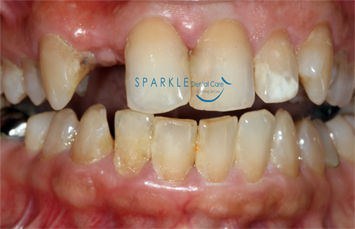
Did you know that the average adult between the ages of 20 and 64 has three or more decayed or missing teeth? If you are missing one or more teeth, there are plenty of reasons to correct the problem. For one thing, a large space between your teeth may affect how you speak or eat. Even if it’s not noticeable, a missing molar can affect how you chew. Remaining teeth may shift and in some cases, bone loss can occur around a missing tooth.
With today’s advances, you don’t have to suffer from missing teeth. Here are some options to replace a lost tooth or teeth:
- IMPLANTS: Most similar to a natural tooth.
- BRIDGES: Anchored to your adjacent teeth, these can be removable or fixed, depending on your mouth and your needs.
- DENTURES: An option if you’ve lost all or most of your teeth.
Back to top
DENTAL IMPLANTS
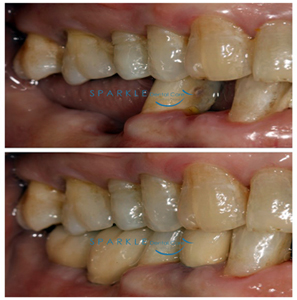
If you are self-conscious because you have missing teeth, wear dentures that are uncomfortable or don't want to have good tooth structure removed to make a bridge, check with us to see if dental implants are an option for you.
Dental implants are a popular and effective way to replace missing teeth and are designed to blend in with your other teeth. They are an excellent long-term option for restoring your smile. In fact, the development and use of implants is one of the biggest advances in dentistry in the past 40 years. Dental implants are made up of titanium and other materials that are compatible with the human body. They are posts that are surgically placed in the upper or lower jaw, where they function as a sturdy anchor for replacement teeth.
Most patients find that a dental implant is secure, stable and a good replacement for their own tooth. There are generally three phases to getting an implant:
- First, we surgically place the implant into the jawbone. We recommend a diet of soft foods, cold foods and warm soup during the healing process.
- Next, the bone around the implant heals in a process called osseointegration. What makes an implant so strong is that the bone actually grows around it and holds it in place. Osseointegration means “combines with the bone” and takes time. Some patients might need to wait until the implant is completely integrated, up to several months, before replacement teeth can be attached to the implant. Other patients can have the implants and replacement teeth placed all in one visit.
- Finally, it’s time for the placement of the artificial tooth/teeth. For a single tooth implant, we will customize a new tooth for you, called a dental crown. The crown will be based on size, shape, color and fit, and will be designed to blend in with your other teeth. If you are replacing more than a single tooth, custom-made bridges or dentures will be made to fit your mouth and your implants. (Note: The replacement teeth usually take some time to make. In the meantime, we may give you a temporary crown, bridge or denture to help you eat and speak normally until the permanent replacement is ready.
If you are interested in dental implants, it's a good idea to discuss it carefully with us first. If you are in good general health this treatment may be an option for you. In fact, your health is more of a factor than your age. You may be medically evaluated by a physician before any implant surgery is scheduled. Chronic illnesses, such as diabetes or leukemia, may interfere with healing after surgery. Patients with these issues may not be good candidates for implants. Using tobacco can also slow healing.
In our office we give you several options as we use multiple systems like the Nobel Biocare Implant System, Dentsply Ankylos Implant System or the Osstem Implant System; to suit your need best. Speak with us; let us clear your doubts and help you know more about this procedure!!!
Back to top
BRIDGES
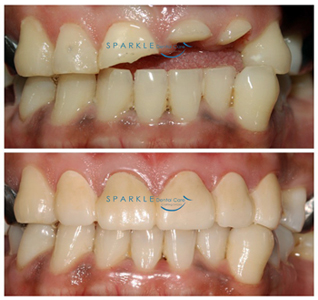
If you’re missing one or more teeth, you may notice a difference in chewing and speaking. Bridges can help restore your smile.
Sometimes called a fixed partial denture, a bridge replaces missing teeth with artificial teeth and literally “bridges” the gap where one or more teeth used to be. Bridges can be made from gold, alloys, porcelain or a combination of these materials and are attached to surrounding teeth for support. Unlike a removable bridge, which you can take out and clean, a fixed bridge can only be removed by a dentist.
An implant bridge attaches artificial teeth directly to the jaw or under the gum tissue. Depending on which type of bridge is recommends, its success depends on the foundation. So it’s very important to keep your remaining teeth healthy and strong. Speak with us; let us clear your doubts and help you know more about this procedure!!!
Back to top
DENTURES
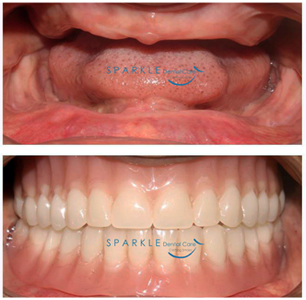
Dentures are removable appliances that can replace missing teeth and help restore your smile. If you’ve lost all of your natural teeth, whether from gum disease, tooth decay or injury, replacing missing teeth will benefit your appearance and your health. That’s because dentures make it easier to eat and speak better than you could without teeth—things that people often take for granted.
When you lose all of your teeth, facial muscles can sag, making you look older. Dentures can help fill out the appearance of your face and profile. They can be made to closely resemble your natural teeth so that your appearance does not change much. Dentures may even improve the look of your smile.
Types of dentures:
- Conventional: This full removable denture is made and placed in your mouth after the remaining teeth are removed and tissues have healed, which may take several months.
- Immediate: This removable denture is inserted on the same day that the remaining teeth are removed. We take measurements and make models of your jaw during a preliminary visit. You don’t have to be without teeth during the healing period, but may need to have the denture relined or remade after your jaw has healed.
- Overdenture: Sometimes some of your teeth can be saved to preserve your jawbone and provide stability and support for the denture. An overdenture fits over a small number of remaining natural teeth after they have been prepared. Implants can serve the same function, too.
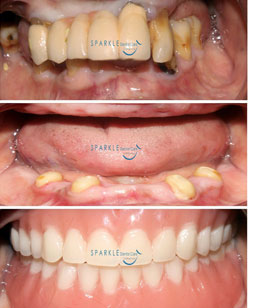
New dentures may feel awkward for a few weeks until you become accustomed to them. The dentures may feel loose while the muscles of your cheek and tongue learn to keep them in place. It is not unusual to experience minor irritation or soreness. You may find that saliva flow temporarily increases. As your mouth becomes accustomed to the dentures, these problems should go away. Follow-up appointments are generally needed after a denture is inserted so the fit can be checked and adjusted. If any problem persists, particularly irritation or soreness, be sure to consult us.
Even if you wear full dentures, you still have to practice good dental hygiene. Brush your gums, tongue and roof of your mouth every morning with a soft-bristled brush before you insert your dentures to stimulate circulation in your tissues and help remove plaque.
Like your teeth, your dentures should be brushed daily to remove food particles and plaque. Brushing also can help keep the teeth from staining.
- Rinse your dentures before brushing to remove any loose food or debris.
- Use a soft bristle toothbrush and a non-abrasive cleanser to gently brush all the surfaces of the dentures so they don't get scratched.
- When brushing, clean your mouth thoroughly—including your gums, cheeks, roof of your mouth and tongue to remove any plaque. This can help reduce the risk of oral irritation and bad breath.
- When you’re not wearing your dentures, put them in a safe place covered in water to keep them from warping.
- Occasionally, denture wearers may use adhesives. Adhesives come in many forms: creams, powders, pads/wafers, strips or liquids. If you use one of these products, read the instructions, and use them exactly as directed.
If you have any questions about your dentures, or if they stop fitting well or become damaged, contact us. Be sure to schedule regular dental checkups, too. We will examine your mouth to see if your dentures continue to fit properly. Speak with us; let us clear your doubts and help you know more about this procedure!!!
Back to top
PARTIAL DENTURES
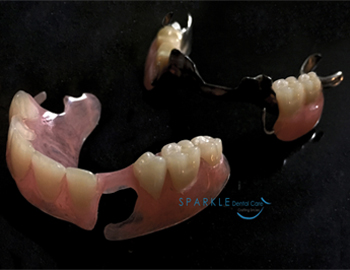
Removable partial dentures usually consist of replacement teeth attached to pink or gum-colored plastic bases. Depending on your needs, your dentist will design a partial denture for you. A partial denture may have a metal framework and clasps that connect to your teeth, or they can have other connectors that are more natural looking. In some cases, a removable partial denture is made to attach to your natural teeth with devices called precision attachments. Precision attachments are generally more esthetic than clasps.
Crowns on your natural teeth are sometimes needed to improve the fit of a removable partial denture and they are usually required with attachments. Partial dentures with precision attachments generally cost more than those with clasps. Consult with us to find out which type is right for you. Speak with us; let us clear your doubts and help you know more about this procedure!!!
Back to top

